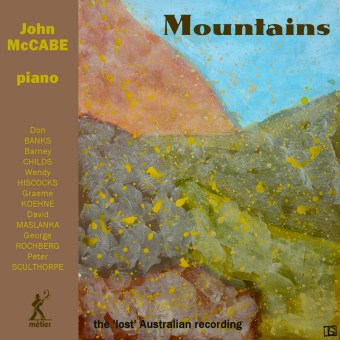American Record Guide
When I noticed that the recording was made in 1985, I checked our index to see if it might have been reviewed earlier. Only later did I read the liner notes and discover that the CD was mastered from a Dolby cassette tape, McCabe’s copy of the sessions recorded in Australia, supplied to him for comment and further editing before commercial release. That final step never took place in his lifetime, but his widow found the tape and brought about its release. And the sound, while a little limited, is perfectly fine.
The program is varied and includes works by composers not usually associated with piano music—especially Peter Sculthorpe and David Maslanka. Sculthorpe’s Mountains opens and closes with slow, contemplative, and sometimes monumental-sounding ideas that remind me of Messiaen’s aesthetic (but not his sound world); a central, more moderately-paced section combines a passionate (but dissonant) melody with a flowing accompaniment. Maslanka’s Piano Song was composed in 1978 during a residency at the McDowell Colony; and like his better known works for winds, it combines simplicity of expression with more or less conventional melody and harmony.
I was particularly excited to hear Barney Childs’s Heaven to Clear When Day Did Close. Childs, an active writer and composer from the West Coast, is less known today than he was in the 1960s and 70s. His music is marvelously eclectic, with a feel for harmony using the characteristic sonorities of the piano. The work is mercurial but makes a strong and lasting impression. Another Australian, Wendy Hiscocks, is represented by a crystaline Toccata that always remains simmering just below the boiling point of excitement. Its craggy har¬monies and unpredictable rhythmic patterns make it a fresh and unusual contribution to the form. The longest work here, Rochberg’s Carnival Music, is typical of his work after his turn away from serial music: a fascinating combination of post-tonal and neoromantic styles that allows for transitions both abrupt and subtle.
@divineartrecordingsgroup
A First Inversion Company
Registered Office:
176-178 Pontefract Road, Cudworth, Barnsley S72 8BE
+44 1226 596703
Fort Worth, TX 76110
+1.682.233.4978












